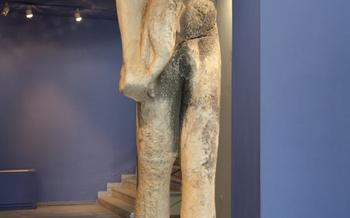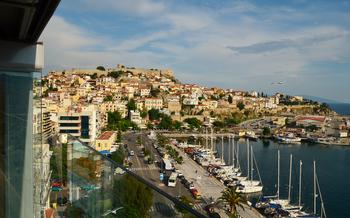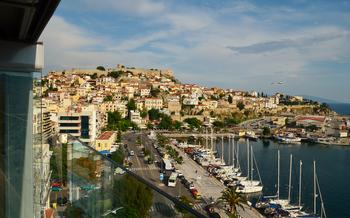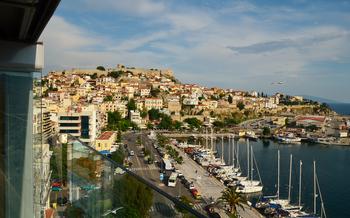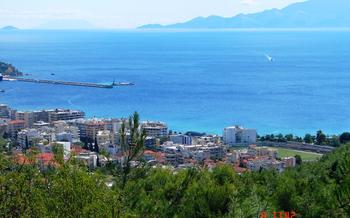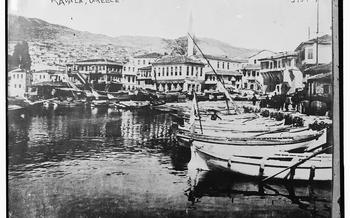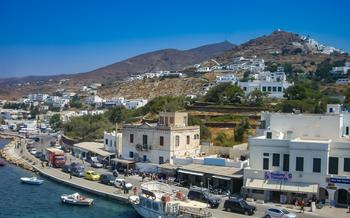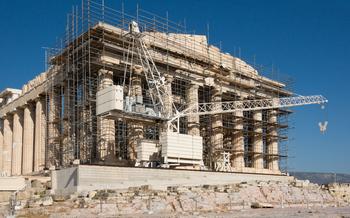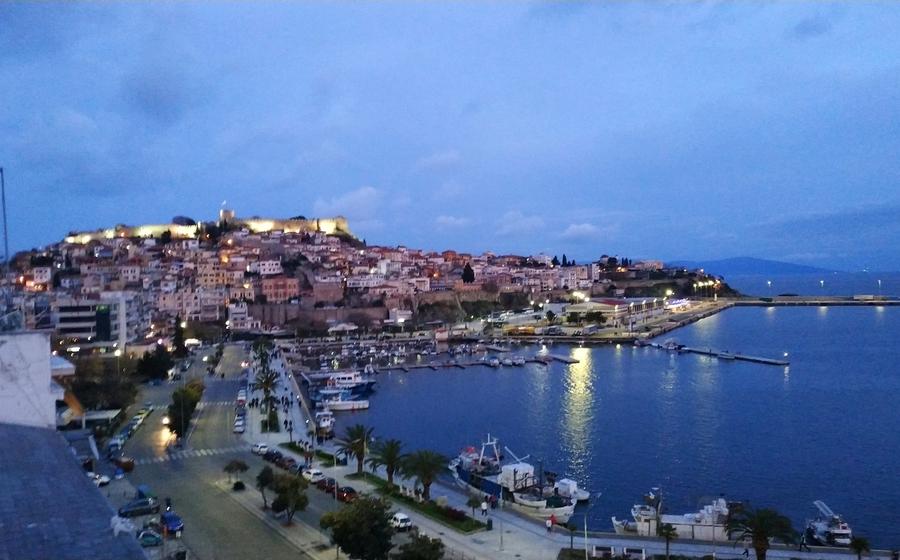
The Olive Oil Museum of Thassos
- History of Olive Oil Production in Thassos
- The Olive Oil Museum of Thassos
- Interactive Exhibits and Workshops
- Guided Tours
- Sensory Experience
- Olive Oil Tasting
- Olive Oil Shop
- Educational Programs
- Surrounding Area
- Accessibility
- Family-Friendly
- Sustainable Practices
- Local Cuisine
- Local Festivals and Events
- Insider Tip
History of Olive Oil Production in Thassos
The history of olive oil production in Thassos dates back to ancient times, with evidence of olive cultivation on the island since the 6th century BC. The ancient Greeks recognized the value of olive oil not only as a food source but also as a valuable commodity for trade and commerce. Over the centuries, olive oil production became deeply ingrained in the local economy and culture of Thassos, with traditional methods passed down from generation to generation. Even today, olive groves cover a significant portion of the island's landscape, and olive oil remains a staple ingredient in Thassian cuisine and a source of pride for the local community.
The Olive Oil Museum of Thassos
Located in the heart of Thassos, the Olive Oil Museum is a must-visit destination for anyone interested in learning about the ancient tradition of olive oil production on the island. Established in 2002, the museum's mission is to preserve and promote the rich cultural heritage associated with olive oil in Thassos. Through a series of engaging exhibits and interactive displays, visitors can embark on a journey through time, exploring the history, techniques, and significance of this liquid gold.
The museum's collection includes a variety of artifacts, tools, and machinery used in olive oil production over the centuries. Visitors can learn about the traditional methods of harvesting, pressing, and storing olives, as well as the different varieties of olive trees cultivated on the island. The museum also showcases the important role that olive oil has played in the local economy and culture, from ancient times to the present day.
Interactive Exhibits and Workshops
The Olive Oil Museum of Thassos offers an array of interactive exhibits and workshops that provide visitors with a hands-on experience of olive oil making. Immerse yourself in the process of olive pressing by participating in a traditional olive press demonstration. Learn about the different stages of olive oil production, from harvesting and sorting the olives to extracting the precious liquid gold.
Engage your senses and explore the interactive displays that showcase the various varieties of olive oil and their unique characteristics. Discover the factors that influence the taste, aroma, and quality of olive oil, and learn how to identify and appreciate the nuances of different oils.
Participate in olive tasting sessions led by experts who will guide you through the art of discerning the subtle flavors and aromas of different olive oil varieties. Understand the significance of factors such as cultivar, terroir, and extraction methods in shaping the distinctive qualities of each oil.
Guided Tours
To fully appreciate the Olive Oil Museum of Thassos and its fascinating exhibits, guided tours are highly recommended. Knowledgeable and passionate guides will lead you through the museum, providing insights into the history of olive oil production on the island, the traditional methods used, and the cultural significance of this liquid gold.
These guided tours offer a deeper understanding of the museum's collection and the significance of olive oil in Thassos. Visitors can ask questions, engage in discussions, and gain a comprehensive perspective on the world of olive oil. Advance booking is recommended to secure a spot, especially during peak tourist season, as these tours are popular and often fill up quickly.
Don't miss the opportunity to embark on a guided journey through the Olive Oil Museum of Thassos and discover the rich history, cultural heritage, and modern innovations surrounding this precious liquid.
Sensory Experience
The Olive Oil Museum of Thassos offers an immersive sensory experience designed to engage visitors on various levels. Through a combination of interactive exhibits and sensory stations, visitors can explore the world of olive oil through sight, smell, and taste. The museum showcases a diverse collection of olive oil varieties, each with its unique characteristics and flavor profile. Visitors can learn about the different factors that influence the taste and aroma of olive oil, such as the climate, soil, and olive variety. Interactive displays allow them to explore interactive displays, allowing them to explore the different factors that influence the taste and aroma of olive oil, such as the climate, soil, and olive variety. Interactive displays allow them to explore the different components of olive oil and their contribution to its overall flavor. By engaging all the senses, the Olive Oil Museum of Thassos provides a multidimensional and memorable experience that helps visitors appreciate the complexity and richness of olive oil.
Olive Oil Tasting
The Olive Oil Museum of Thassos offers guided olive oil tasting sessions led by experts who provide insights into the flavor profiles and uses of various olive oils. This sensory experience allows visitors to sample a diverse range of olive oils, each with its own unique characteristics.
Visitors can learn to distinguish between different varieties of olives, such as Koroneiki, Athinoelia, and Throumpolia, and explore the influence of climate, soil, and production methods on the taste and aroma of olive oil. Guided tastings provide an opportunity to understand the nuances of olive oil flavors, from fruity and grassy to spicy and peppery, and how they complement different foods.
The museum's olive oil tasting sessions are an interactive and educational way to appreciate the rich flavors and culinary versatility of Thassian olive oil. Whether you are a casual foodie or a passionate olive oil enthusiast, the museum's tasting experiences offer a unique opportunity to deepen your knowledge and appreciation of this liquid gold.
Olive Oil Shop
The Olive Oil Museum of Thassos features a well-stocked gift shop where visitors can purchase a variety of high-quality olive oils and related products. This is an excellent opportunity to support local producers and take home a taste of Thassos.
The shop offers a wide selection of extra virgin olive oils, each with its unique flavor profile and characteristics. Visitors can choose from a variety of cultivars, including the renowned Thassos variety, known for its delicate and fruity flavor.
In addition to olive oil, the shop also sells a range of other products made from olives, such as tapenades, spreads, and soaps. These products make for excellent gifts or souvenirs, allowing visitors to share the taste of Thassos with friends and family back home.
By purchasing products from the Olive Oil Museum shop, visitors not only get to take home a piece of Thassos but also contribute to the local economy and support the preservation of the island's olive oil-making traditions.
Educational Programs
The Olive Oil Museum of Thassos offers a range of educational programs designed to deepen visitors' understanding of olive oil production, history, and culture. These programs are tailored to various audiences, including students, researchers, and the general public.
For students, the museum provides educational workshops and seminars that cover topics such as the science of olive oil production, the history of olive cultivation in Thassos, and the cultural significance of olive oil in the region. These workshops are led by experts in the field and offer hands-on learning experiences.
Researchers can engage in olive oil-related projects in collaboration with the museum's staff. The museum provides access to its collection of artifacts, research facilities, and expertise. Researchers can conduct studies on olive oil production techniques, the chemical composition of olive oil, and the health benefits of olive oil.
The museum also offers educational programs for the general public. These programs include guided tours, lectures, and tasting sessions. Visitors can learn about the history of olive oil production in Thassos, the different varieties of olives grown on the island, and the process of making olive oil. They can also participate in olive pressing demonstrations and taste a variety of olive oils.
Surrounding Area
The Olive Oil Museum of Thassos is conveniently located, providing visitors with the opportunity to explore the island's many other attractions. Just a short drive away, visitors can soak up the sun and enjoy the crystal-clear waters of Thassos' stunning beaches, such as Golden Beach, Paradise Beach, and Aliki Beach. For those interested in history and culture, the island offers a wealth of ancient ruins and archaeological sites, including the Ancient Agora, the Temple of Athena Poliouchos, and the Archaeological Museum of Thassos. Thassos Town, the island's capital, boasts a charming old town with narrow streets, traditional tavernas, and shops selling local products. Visitors can also explore the island's traditional villages, such as Panagia, Potamia, and Theologos, each with its unique character and charm. With its breathtaking natural beauty, rich history, and vibrant culture, the island of Thassos offers visitors an unforgettable experience.
Accessibility
The Olive Oil Museum of Thassos is committed to ensuring that all visitors, regardless of their physical abilities, can enjoy and learn from the museum's exhibits and programs. The museum's facilities are designed to accommodate visitors with disabilities, including accessible parking spaces, wheelchair ramps, and elevators. Visitors with disabilities can also request assistance from the museum staff, who are always happy to help.
Family-Friendly
The Olive Oil Museum of Thassos offers an engaging and educational experience for visitors of all ages. Interactive exhibits, hands-on activities, and guided tours are designed to captivate the interest of children and adults alike. Families can participate in olive pressing demonstrations, learn about the different stages of olive oil production, and taste a variety of olive oils. The museum also offers educational programs and workshops tailored to engage children and families, providing a fun and informative way to immerse themselves in the world of olive oil. Whether you're a family of history buffs, foodies, or simply looking for a unique and educational experience, the Olive Oil Museum of Thassos is the perfect destination.
Sustainable Practices
The Olive Oil Museum of Thassos is committed to sustainability and environmental responsibility, promoting organic and sustainable olive oil production methods. The museum showcases the traditional techniques used by local farmers to produce high-quality olive oil while preserving the island's natural resources. Visitors can learn about the importance of sustainable practices, such as water conservation, recycling, and waste reduction, and how these practices contribute to the preservation of Thassos's unique olive oil heritage. The museum also encourages visitors to support local producers who prioritize sustainability and use environmentally friendly practices in their olive groves. By embracing sustainable practices, the Olive Oil Museum of Thassos helps to protect the island's environment and ensure the long-term viability of its olive oil industry.
Local Cuisine
Olive oil is not just a condiment or cooking ingredient in Thassos; it is an essential part of the local cuisine, adding a distinct flavor and aroma to traditional dishes. From simple salads and grilled meats to hearty stews and seafood platters, olive oil is generously used to enhance the taste and nutritional value of every meal.
One of the most iconic Thassian dishes is the Thassian salad, a colorful and flavorful combination of fresh tomatoes, cucumbers, onions, olives, and feta cheese, generously drizzled with local olive oil. The oil's fruity and peppery notes perfectly complement the sweetness of the tomatoes and the saltiness of the cheese, creating a harmonious and refreshing dish.
Another must-try is the Thassian olive bread, a crusty and aromatic loaf made with freshly ground flour and local olive oil. The bread's golden-brown crust and soft, chewy interior make it a perfect accompaniment to any meal or as a snack on its own.
For a taste of the sea, try the grilled octopus with olive oil and lemon. The tender octopus is grilled to perfection and served with a simple dressing of olive oil, lemon juice, and fresh herbs. The olive oil adds a rich and savory flavor to the octopus, enhancing its natural sweetness and complementing the tangy lemon.
Thassian cuisine is a celebration of fresh, local ingredients, and olive oil plays a central role in showcasing the island's culinary heritage. Whether you're dining in a traditional taverna or cooking your own meals in a holiday rental, be sure to experiment with the different varieties of olive oil and discover the unique flavors that they bring to your dishes.
Local Festivals and Events
Thassos's vibrant olive oil culture is celebrated through various festivals and events throughout the year, offering visitors an immersive and authentic experience. The annual Olive Oil Festival, held during the harvest season in October or November, is a highlight for many. This lively event showcases the island's olive oil production process, with demonstrations, tastings, and exhibitions. Visitors can witness the traditional olive pressing method using stone mills and taste freshly pressed olive oil, gaining a deeper appreciation for the skill and effort involved in creating this liquid gold. Other events include cooking demonstrations, cultural performances, and traditional music, providing a glimpse into the rich heritage of Thassos and its deep connection to olive oil.
Insider Tip
For an unforgettable experience, plan your visit to the Olive Oil Museum of Thassos during the olive harvest season, which typically runs from October to November. During this time, the museum offers unique opportunities to witness the traditional olive pressing process firsthand and participate in hands-on activities. Visitors can join local farmers in the olive groves, learn about the harvesting techniques, and experience the thrill of extracting fresh olive oil using centuries-old methods. The museum also organizes special events and workshops during the harvest season, providing visitors with an immersive cultural experience and a deeper understanding of the significance of olive oil in Thassos.
